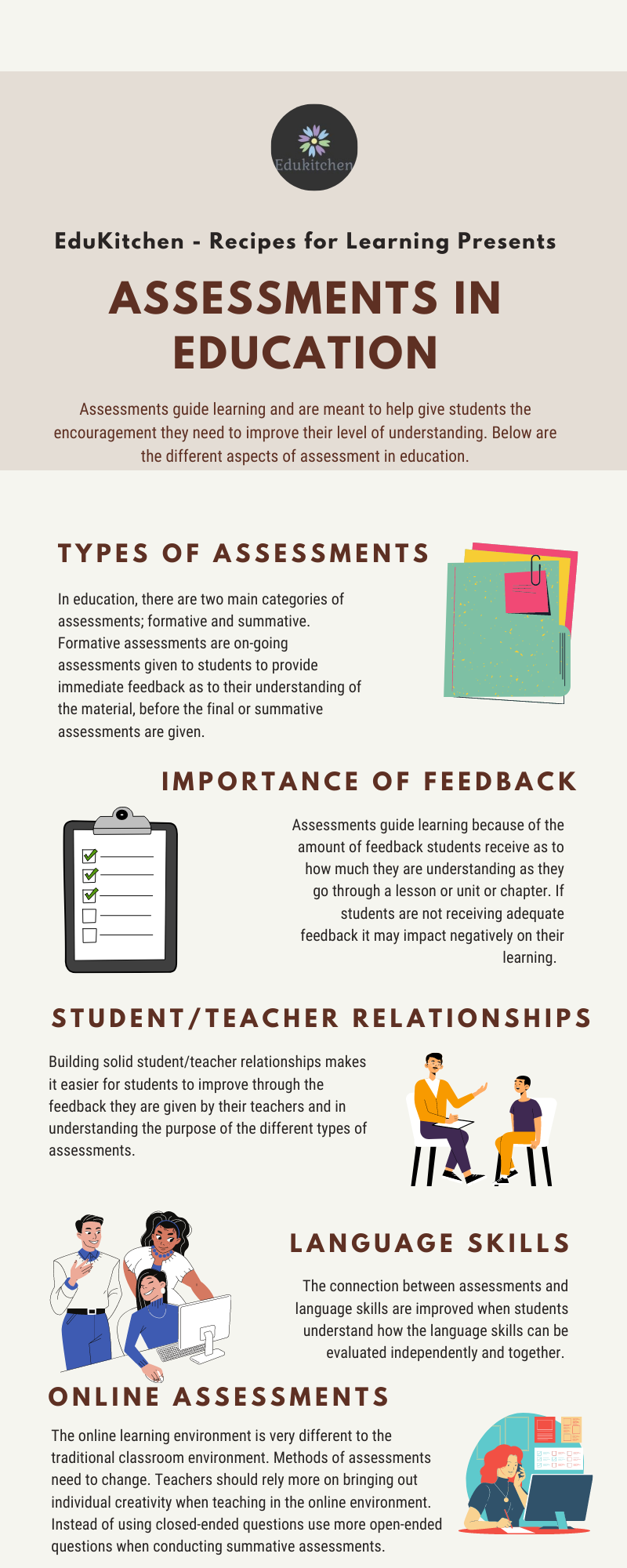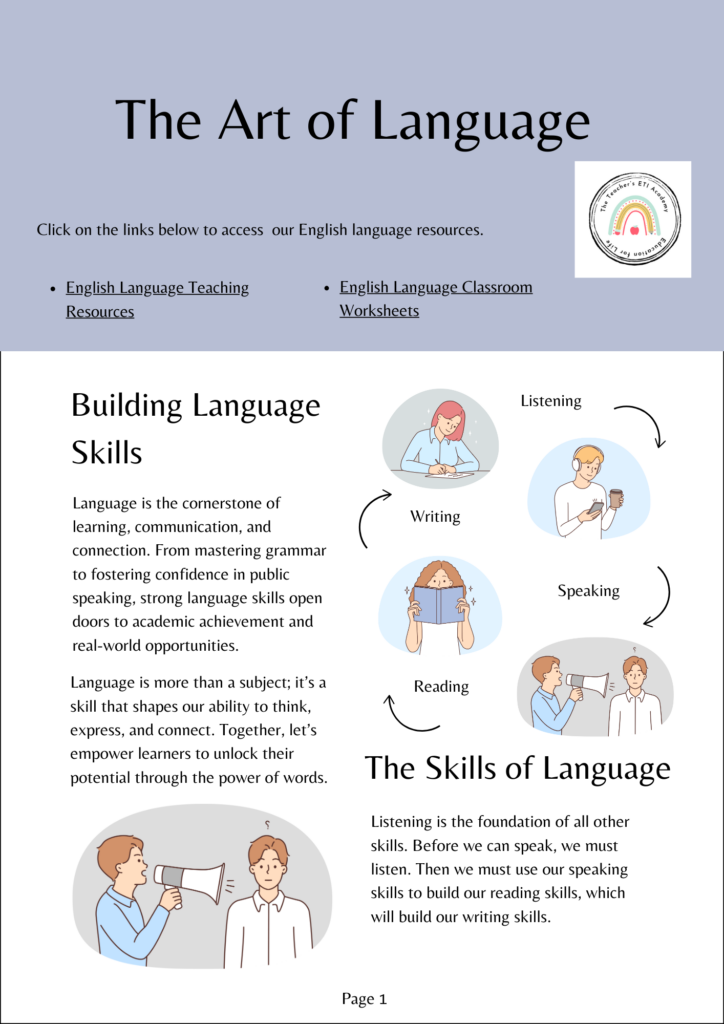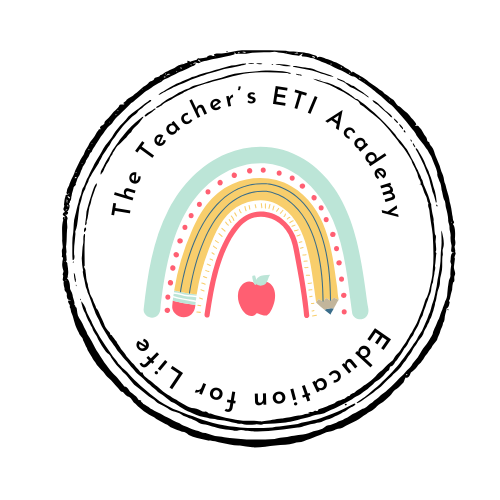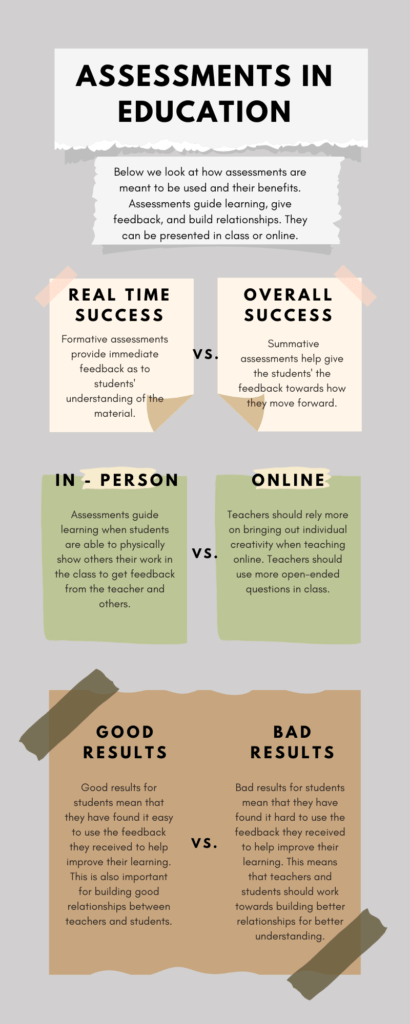What Are Formative Assessments in Education?
Formative assessments in education are tools and strategies used by teachers to monitor student learning and provide ongoing feedback. Unlike summative assessments, which evaluate learning at the end of a unit, formative assessments happen during the learning process. Their primary purpose is to identify areas where students are excelling or struggling, enabling teachers to adjust their instruction and help students improve.
In this article we focus on the different kinds of formative assessments, their connection to learning, and how best to use them in any classroom
Assessments guide learning, and so lesson plans must include references to them in order to be effective.
Lesson Planning and Formative Assessments In Education
Formative assessments play a critical role in lesson planning by providing valuable insights into student understanding and progress throughout the learning process. These assessments, such as quizzes, class discussions, or exit tickets, enable teachers to gauge what students have grasped and where they may need additional support.

By analyzing this feedback, educators can adjust their lesson plans in real-time, ensuring that instruction addresses students’ specific needs and learning gaps. Incorporating formative assessments into lesson planning fosters a more student-centered approach, promoting active engagement and mastery of content. This continuous feedback loop not only enhances the effectiveness of lessons but also empowers students to take ownership of their learning journey.
Watch our video below on the importance of lesson planning and the important points teachers need to consider when formulating an effective lesson plan.
In understanding at assessments, we look at how assessments are defined, their connection to skills building through proper questions, and how best to use them in any classroom.
The Purpose of Formative Assessments
What is meant by the word assessment?
The root word is assess. It comes from the Latin word “sit by” and has evolved to mean “evaluate” or “judge” in today’s English language. And this word judge is what seems to leave students frustrated sometimes when it comes to traditional forms of assessments given by teachers. In this article we look to understanding the purpose behind formative assessments.
Therefore, teachers need to be cognizant of the kind of assessment they use and when is the best time to use such assessments that don’t leave students frustrated.
This will make it easier to see how to use them to bring out the best in students and their abilities.
To learn more about summative assessments, click here.
Once teachers use assessments to understand their students better, then they can begin to introduce differentiated instruction methods to help students be at their best.
Grammarly and Formative Assessments in Education
This blog contains affiliate links to highlighted websites and/or resources. By clicking on the link and making a purchase we may earn a small commission at no extra cost to you. Click here for full disclosure.
Formative assessments and tools like Grammarly can work hand-in-hand to enhance students’ writing skills and overall learning experience. Formative assessments provide real-time feedback on student progress, highlighting areas where improvement is needed, while Grammarly serves as a digital writing assistant to reinforce these skills.
Consider taking advantage of the benefits grammarly brings to teachers and students in looking to help with honest language development. Click here to get all the grammar help you will need.
By using Grammarly during writing exercises, students can receive instant suggestions for grammar, punctuation, and style, which complements the feedback provided by the teacher. This combination allows students to identify patterns in their mistakes and develop stronger writing habits. Integrating Grammarly into formative assessments not only streamlines the evaluation process but also empowers students to take an active role in refining their communication skills.
What Are Formative Assessments in Education?
These assessments are done with the purpose of having the teacher “form” an understanding towards students’ strengths and weaknesses. Using this information teachers can then provide feedback to students to help them succeed academically. They are informal and on-going.
Formative assessments are informal and are given at any point throughout lessons. These assessments allow teachers to give students feedback on their understanding or work during the lesson.
As for the types of formative assessments; they are wide ranging from such examples as
- anecdotal notes made from observations
- questions and answers
- asking students to draw images to show understanding
- asking students to give topic ideas for projects
- responses to class work
- oral readings
- mini-presentations
- pop quizzes on a lesson
Portfolios are collection of students’ work that may be used to give feedback on students’ growth in learning.

Using a variety of formative assessments will helps teachers with lesson planning, and can make students feel more relaxed as they see the progress they are making as it happens.
Click here for resources in building formative assessment tools.
Language Skills and Formative Assessments in Education
In assessing language skills, how should teachers begin?
There are four language skills students learn to master in their academic career; listening, speaking, reading, and writing.
In creating assessments for these language skills it’s important that teachers keep in mind ways to assess all four language skills in one lesson.
Passive vs. Active Skills
I believe that language building begins with the passive skills and then transitions to the active skills.
Passive skills are ones in which the learner does not need to produce language, just to receive and understand the language.
Click on the image of our free passive and active skills newletter resource to gain more insights into helping students build their language skills.
Active skills, as the name implies, is when learners with produce language in order for others to receive and understand the language.
I now look at the ways we can build our four language skills; listening, speaking, reading, and writing.
Building Listening Skills
Listening is the first passive skill that we work on building from an early age. Assessments need to strengthen the listening skills of students.
For example, this can be done by asking students to follow directions, and to demonstrate what they heard.

Then teachers can assess through observations which students were able to demonstrate what they heard correctly.
Building Speaking Skills
Speaking is the first active skills students need to build as they continue to master their listening skills.
For example the teacher can ask for students to repeat back the directions given, comment on the direction given, or ask any questions they have as to the directions given.
Building Reading Skills
Reading is the second passive skills that builds on having students continue to master speaking skills.
Now learners relate sounds to words, and so they are able to understand words as they pronounce or listen to them being pronounced.
Building Writing Skills
Writing is the second active skill and the last skill to be mastered as it builds on all three of the previous skills.
This active skills is generally the hardest skills for students to master as it requires more knowledge than the previous skills in building understanding through communication.
A fun and challenging exercise teachers can do with students to assess both passive and active skills is to divide the students into two groups and ask one group to give directions.
For example, one group can ;
- give directions to a location,
- build a recipe
- build an an object
and have the other group use their passive skills to assess how well the directions were given to accomplish the task.
Find more information related to language development by clicking here.
Math Skills and Assessments
How can assessments work to enhance math skills?
When students understand how assessment work in building skills, especially problem solving skills, then students will gain confidence when faced such assessments during math lessons.
Math assessments are more defined in that they provide its own form of feedback without the teacher.
How the teacher uses formative assessments in math makes a world of difference for students.
When assessing students knowledge on math topics, teachers should have students communicate their answers in full showing how they got their answer each step of the way.

Teachers and students can then see where mistakes were made along the way, rather than just using the answer as the assessment.
One thing students appreciate is when math teachers recognize their efforts when giving an answer to a math question.
When teachers give students part marks, instead of giving a complete zero on the question because the final answer is wrong. students begin to gain confidence.
Of course, the right answer to math questions is very important,.
But in order for students to connect more to the subject and reduce anxiety, how students get the answers using problem solving strategies matters much more.
Formative Assessments In The Classroom
How can assessments be used in the classroom to build better connections between teachers and students?
One thing is for sure, students do not want to be stuck doing worksheets all day, so how can teachers make assessment beneficial for students?
Variety and pace are the keys.
Since formative assessments are so informal and on-going, students need not be aware of just how often they are being assessed.
When teachers assess students quickly and often, teachers build stronger connections to their students by helping to guide their learning through their feedback.

If teachers are slow to offer feedback or don’t offer enough, students may feel lost or disconnected to the subject they are learning and therefore are unable to find the success they are seeking.
Therefore, teachers should not underestimate the value of assessments in helping students be their best.
Assessments In The Online Classroom
The online learning environment is very different to the traditional classroom environment. Methods of assessments need to change. This is one struggle online teachers seemed to have little to no control over.
Why was there such a struggle? The online environment made cheating much more convenient and harder to recognize.
Teachers in the online classroom found they had less control as to what their students are doing while at home.
And so when they ask a question, how can they be sure this question won’t be shared with others through their mobile phones to help get answers to questions?So then the question remains, how should formative assessments change in the online classroom?
The answer is to have more open-ended questions over closed-ended questions.
What are open-ended questions? These are questions that begin with “how” or “why”, and are known as thinking questions.
In this case the teacher assess how the students were able to interpret the main points. Closed-ended questions have direct answers and begin with “what”, “where”, and “when”.
Open-ended questions are harder to cheat from than closed-ended questions.
You may ask, how does it work to give open-ended questions in subjects such as math.
Popular questions usually provide the answer and ask, is this the correct answer? Or they may ask, how did so-and-so come to reach this answer.
In the end, if students are going to cheat they will try regardless if it’s in the in-person class or in the online class.
In order to minimize this from happening in either classroom, teachers need to emphasize to students the consequences for anyone caught cheating before beginning the actual assessments.
One other strategy that works in trying to stop students from cheating during an online assessment is to create the assessment with “how easy is it to cheat” in mind!
Related Topics
Connect to our other pages as you navigate through our website. Explore what these pages have to offer you and you will be glad you did!
- ELA Oral Presentation Rubrics for the Classroom
- Teacher Identity in the Online Classroom
- How to Build Effective Classroom Management Strategies
- Effective Lesson Plans Checklist for Teachers
- 5 Important Tips for PreService Teachers
- How to Use Summative Assessments for Student Comprehension
- How Constructive Feedback Improves Student Learning
Join Us Today!

Final Thoughts…
Assessments in education help guide policy decisions, and are meant to improve on teaching and learning strategies. There is no one size fits all type of assessment as learners have different preferred styles of learning.
Effective assessments, whether they be formative or summative in nature, always do one thing, and that is to motivate and inspire students to be the best they can be with their abilities.
Find more information related to classroom management by clicking here.
Share Your Thoughts!
I would like to hear from you! Let know your thoughts in the comments below on how best to assess students in the classroom whether you are or are not a teacher! Connect with us on social media!









